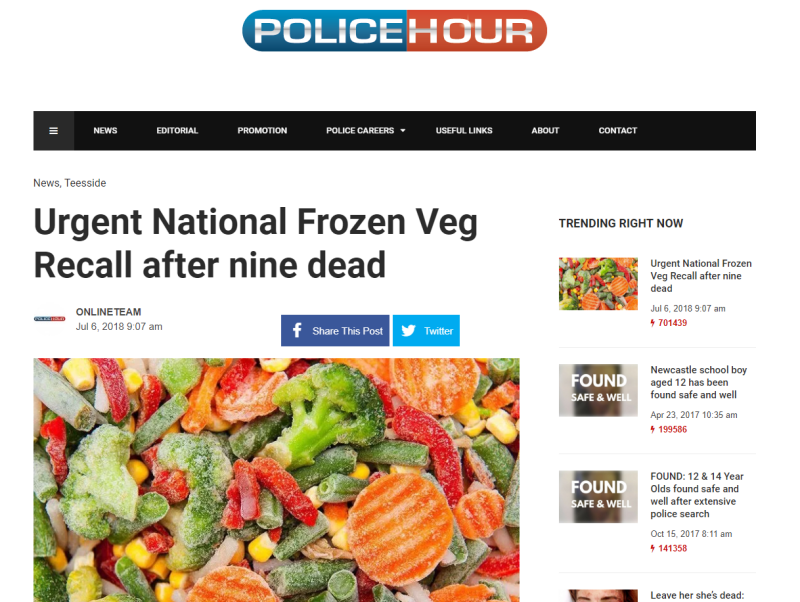
A specialist unit set up last year to monitor and combat “fake news” and disinformation online is set to continue operating after its pilot phase was deemed a success by the Government.
The Rapid Response Unit, which is based across the Cabinet Office and Number Ten, has secured funding to continue its work for the foreseeable future after launching in April 2018.
The team – dubbed the “fake news unit” by the media – monitors online trends and decides the best way to respond to “stories of concern” with a Government and public services link.
When the Times reported last year that murder rates in London had outstripped those in New York for the first time, the RRU took action to “prevent panic” in the face of what it said were “alarmist news stories”.
It pushed out content on social media to “rebalance the narrative and reassure those most engaged with the topic”, Government communications director Alex Aiken (pictured) said in a blog post, reported by Press Gazette.
The unit also carries out analyses of “major trends in online government-related discussion”, according to a blog post by Cabinet Office data journalist Oliver Marsh.
This is used to support the work of the Cabinet Office’s Media Monitoring Unit, which delivers a daily news briefing for all Government departments on the biggest social media stories, Marsh said.
Writing for the Government’s Communications Service, Marsh shed some light on the RRU’s activities during 2018, when it was kept largely under wraps.
The top viral public sector-related story of 2018 with nearly 1m reactions, comments and shares was a story from Police Hour, a website “for all members of the policing family”, Marsh revealed.
It was headlined: “Urgent National Frozen Veg Recall after nine dead”, which was followed up by larger titles including the Guardian, the Independent and the Metro.

The RRU categorised the story as “misinformation” because although there had been nine deaths related to the rare bacterial infection listeria across Europe since 2015, the headline and story “could have been understood to mean the deaths were all recent and in Britain”, Marsh said.
The Government defines misinformation as “inaccurate or misleading content” and disinformation as “false content deliberately spread with intent to deceive”. Disinformation is commonly known as fake news.
Marsh said the Police Hour article’s shares were “probably due to people spreading the story to ensure friends and family avoided the potentially contaminated products, without checking the accuracy of the headline”.
The unit responded by sharing content from the Food Standards Agency on Government social media channels “to ensure reliable information was visible to the public”.
Other than pushing its own content on social media, the RRU’s interventions can include boosting Google rankings of relevant Government information in response to what it describes as “sensationalist” stories.
Today, the top-ranked article on Google when searching for the Police Hour headline is an article by US fact-checking website Snopes headlined: “UK Supermarkets Recall Frozen Vegetables Over Listeria Concerns.”
Marsh’s blog also revealed that Brexit was the most common subject of Government-related online news stories and social media posts in 2018 “as captured by government policy-related filters”, with #Brexit estimated to be the fourth most tweeted hashtag in the UK.
The most vocal voices in the Brexit debate were at either end of the spectrum – supporting a no-deal departure or second referendum, Marsh wrote.
“However, we know that polarised online debate does not always necessarily reflect public sentiment and should not be analysed in isolation,” he said.
“Therefore we also analysed search engine data, and drew on findings from publicly available research. This all indicated an ongoing demand for clear, straightforward factual information on Brexit.”
The RRU found that despite the twists and turns of the Prime Minister’s negotiations with the EU, online discussion continued to focus on long-running questions, such as: “Will there be a second referendum?”, “What might no-deal look like?” and “Was the first referendum legitimate?”
But “viral” Government stories (those with very high numbers of reactions, shares and comments across social media) were not just about Brexit, which accounted for just 15 per cent of the top 100. A quarter of the top viral stories were about the environment.
The RRU also monitors “alternative news outlets” and saw crime and Brexit as the most popular Government-related topics on such websites in 2018.
Marsh picked out right-wing news website Breitbart as an example of an “alt-news outlet with an international audience” that reported on a number of violent crimes last year.
“Much of their reporting argued that strict gun controls in the UK had not stopped crimes (gun control was a major topic in America at the time),” he said.
“Similarly, we also saw a rise in outlets which produced almost entirely pro-Brexit material from an anti-immigrant stance. Such content regularly received more reactions, comments, and shares than Brexit articles from mainstream outlets.
“However closer inspection suggested a possible echo-chamber effect, in which most engagement came via networks of Facebook pages with similar views. This is a reminder that high levels of online engagement do not necessarily show a wide spread of views.”
Email pged@pressgazette.co.uk to point out mistakes, provide story tips or send in a letter for publication on our "Letters Page" blog
